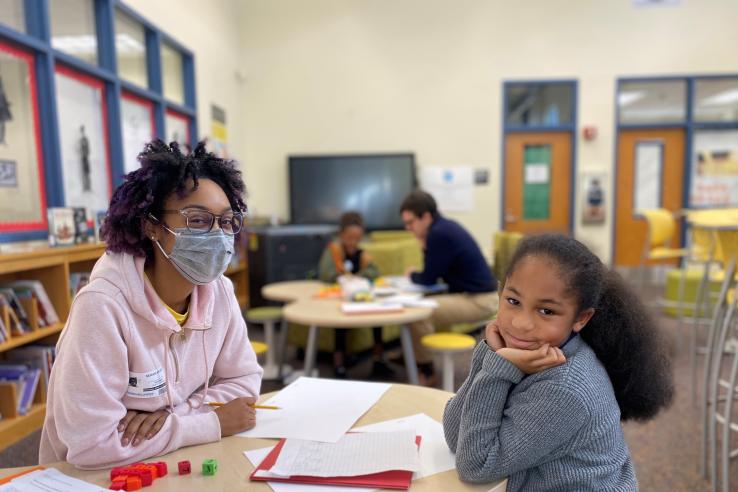
Tutoring Evaluation Accelerator: Building partnerships to accelerate learning

Learning disruptions from Covid-19 have compelled policymakers to invest in learning acceleration strategies—including high-impact tutoring—as quickly as possible. As education agencies implement and scale these programs, however, many have needed to adapt evidence-based models to better fit the needs of their students. These innovations have the potential to expand access to tutoring, but their impacts and sustainability are not yet known. J-PAL North America is partnering with Accelerate to launch the Tutoring Evaluation Accelerator, which aims to support ten tutoring providers from Accelerate’s Call to Effective Action to implement data-driven programs and generate critical evidence on tutoring.
The need to accelerate student learning
School closures and other Covid-19 interruptions resulted in prolonged disruptions to learning across the United States. These disruptions led to test score declines in reading and math, particularly among students of color, students from low-income households, and students in schools with high poverty rates. Equitable education recovery calls for investment in evidence-based learning acceleration strategies, such as tutoring.
Rigorous research has identified tutoring—supplemental one-on-one and small group instruction—as a proven strategy to accelerate learning. A 2020 meta-analysis of 96 tutoring-focused randomized evaluations by Andre Nickow (Northwestern), J-PAL education sector Co-Chair Phil Oreopoulos (University of Toronto), and J-PAL North America Co-Executive Director Vincent Quan found that tutoring is a highly effective tool for accelerating learning. The most effective programs had three key elements in place: tutoring was delivered at school during the school day; tutoring occurred three or more days a week; and tutors were paid, trained, and received continuous coaching.
J-PAL North America summarized these findings in an Evidence Review and disseminated results to policymakers and education agencies nationwide. Policymakers responded quickly to the evidence on tutoring. Citing J-PAL North America’s research, the White House called for states to leverage American Rescue Plan funds to invest in high-impact tutoring. This research also informed state efforts: in 2021, California and Colorado both passed legislation to expand high-dosage tutoring based on findings from the meta-analysis. Nearly two-thirds of states have allocated Covid-relief funding to tutoring.
New opportunities for evaluation
Fueled by these policies, funds, and evidence, many schools and districts are implementing tutoring programs to help students recover from prolonged disruptions to learning. However, even with these resources, implementing tutoring programs with fidelity to the research is a significant challenge.
Providers are facing nationwide staffing shortages, time-limited funds, and site-specific scheduling challenges—barriers that have forced education leaders to think creatively about how to deliver tutoring to students. As a result, many program models diverge from evidence-based practices to better meet the needs of schools and students. For example, some programs are operating online or after school.
These adaptations have produced new opportunities for research to understand program impact. Some recent studies have found promising results for new models—such as hybrid learning—but more comprehensive research is needed to identify the most effective and scalable tutoring designs.
Building researcher-practitioner partnerships to support implementation and evidence generation
To address these urgent challenges, J-PAL North America is partnering with Accelerate to launch the Tutoring Evaluation Accelerator (TEA). Accelerate funds and supports rigorous, high-quality research to systematically study innovative and promising models with the potential to scale to serve millions of students. Their recent Call to Effective Action aims to expand access to high-impact tutoring and raise student achievement. The TEA will support tutoring providers across the United States to implement data-driven programs and generate critical evidence on what works in high-dosage tutoring.
From May to December 2023, J-PAL North America will deliver customized trainings on key evaluation concepts, provide hands-on technical assistance on evaluation design, and build connections with expert researchers in J-PAL’s network for a cohort of ten tutoring providers. Drawing from expertise in J-PAL North America’s Evaluation Toolkit, the cohort will learn fundamental concepts about randomized evaluations. Topics include theories of change, measurement, why and how to randomize, statistical power, and sample size. Participants will collaborate frequently and build a network of partners dedicated to delivering high quality, effective tutoring to K–12 students. This suite of activities and supports will prepare TEA participants to both implement tutoring and rigorously assess that tutoring through randomized evaluations.
TEA participants are implementing a wide array of tutoring designs as part of their 2023-2024 Call to Effective Action projects. Once, Bamboo Learning, Amplify, and Ignite! Reading focus their programming on literacy instruction. Reading Futures supports children with indications of dyslexia. Other partners leverage different types of tutors: Heart Math Tutoring utilizes volunteers and Tutored by Teachers works strictly with US-certified teachers. KIPP Indy is focused on tutor development through observation and real-time feedback from instructional coaches. Some partners use different class settings and tutoring structures. For example, FEV Tutor is implementing virtual tutoring and Littera will assess the additive benefit of combining a virtual tutor with intervention software. With a breadth of pedagogical approaches represented among the participants, the TEA will substantially expand the base of evidence on the most effective tutoring designs to help students at scale.
If you’re interested in learning more about this engagement, please contact Kim Dadisman, J-PAL North America’s Associate Director of Policy. Information and resources about the evidence on high-impact tutoring can be found on our tutoring webpage. For more information about Accelerate, visit their webpage.


